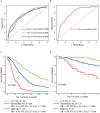A Prognostic Model for Breast Cancer With Liver Metastasis
- PMID: 33014776
- PMCID: PMC7493788
- DOI: 10.3389/fonc.2020.01342
A Prognostic Model for Breast Cancer With Liver Metastasis
Abstract
Background: Breast cancer with liver metastasis consists of a group of heterogeneous diseases, and survival time may be significantly different, ranging from a few months to several years. The present study aimed to develop and externally validate a prognostic model for breast cancer with liver metastasis (BCLM). Methods: In total, 1022 eligible patients from January 2007 to December 2018 were selected from Fudan University Shanghai Cancer Center (FUSCC) and were temporally in the training (n = 715) and validation (n = 307) set. According to regression coefficients found in the multivariate Cox regression analysis, the final results were transformed into the prognostic scores. On the basis of these scores, patients were finally classified into three risk groups, including low-, intermediate-, and high-risk groups. Bootstrapping was used for internal validation. Then, time-dependent receiver operating characteristic (ROC) curves and calibration plots were used to assess discrimination and calibration of this prognostic model in the validation set. Results: Molecular subtypes, metastatic-free interval (MFI), extrahepatic metastasis, and liver function tests were identified as independent prognostic factors in the multivariate analysis. According to risk stratification, intermediate-risk (hazard ratio (HR) 2.12, 95% confidence interval (CI) 1.74-2.58, P < 0.001) and high-risk groups (HR 6.94, 95% CI 5.25-9.16, P < 0.001) had significantly worse prognoses in comparison with the low-risk group regarding overall survival (OS) from the time of metastasis. The median OS in these three groups were 39.97, 21.03, and 8.80 months, respectively. These results were confirmed in the internal and external validation cohorts. Conclusions: Based on molecular classification of tumors, routine laboratory tests, and other clinical information easily accessible in daily clinical practice, we developed a clinical tool for BCLM patients to predict their prognosis. Moreover, it may be useful for identifying the subgroup with unfavorable prognosis and individualization of treatment.
Keywords: breast cancer; liver metastasis; prognostic factors; prognostic model; prognostic score.
Copyright © 2020 Ji, Fan, Zhu, Gao and Wang.
Figures


Similar articles
-
Prognostic Score for De Novo Metastatic Breast Cancer With Liver Metastasis and Its Predictive Value of Locoregional Treatment Benefit.Front Oncol. 2021 Aug 27;11:651636. doi: 10.3389/fonc.2021.651636. eCollection 2021. Front Oncol. 2021. PMID: 34513662 Free PMC article.
-
An internally and externally validated prognostic score for metastatic breast cancer: analysis of 2269 patients.Ann Oncol. 2014 Mar;25(3):633-638. doi: 10.1093/annonc/mdt539. Epub 2013 Dec 23. Ann Oncol. 2014. PMID: 24368402 Free PMC article.
-
BRENDA-Score, a Highly Significant, Internally and Externally Validated Prognostic Marker for Metastatic Recurrence: Analysis of 10,449 Primary Breast Cancer Patients.Cancers (Basel). 2021 Jun 22;13(13):3121. doi: 10.3390/cancers13133121. Cancers (Basel). 2021. PMID: 34206581 Free PMC article.
-
Prognostic factors and survival according to tumor subtype in newly diagnosed breast cancer with liver metastases: A competing risk analysis.Mol Clin Oncol. 2019 Sep;11(3):259-269. doi: 10.3892/mco.2019.1890. Epub 2019 Jul 1. Mol Clin Oncol. 2019. PMID: 31396386 Free PMC article.
-
Analysis of the metastatic mechanism and progress in the treatment of breast cancer liver metastasis: a narrative review.Transl Cancer Res. 2023 Jun 30;12(6):1635-1646. doi: 10.21037/tcr-22-2463. Epub 2023 Jun 19. Transl Cancer Res. 2023. PMID: 37434684 Free PMC article. Review.
Cited by
-
Combining PEGylated mito-atovaquone with MCT and Krebs cycle redox inhibitors as a potential strategy to abrogate tumor cell proliferation.Sci Rep. 2022 Mar 24;12(1):5143. doi: 10.1038/s41598-022-08984-6. Sci Rep. 2022. PMID: 35332210 Free PMC article.
-
The global status of research in breast cancer liver metastasis: a bibliometric and visualized analysis.Bioengineered. 2021 Dec;12(2):12246-12262. doi: 10.1080/21655979.2021.2006552. Bioengineered. 2021. PMID: 34783637 Free PMC article.
-
Risk Factors and Survival of Patients With Liver Metastases at Initial Metastatic Breast Cancer Diagnosis in Han Population.Front Oncol. 2021 May 11;11:670723. doi: 10.3389/fonc.2021.670723. eCollection 2021. Front Oncol. 2021. PMID: 34046360 Free PMC article.
-
Tumor-Derived Exosomes Modulate Primary Site Tumor Metastasis.Front Cell Dev Biol. 2022 Mar 2;10:752818. doi: 10.3389/fcell.2022.752818. eCollection 2022. Front Cell Dev Biol. 2022. PMID: 35309949 Free PMC article. Review.
-
Different risk and prognostic factors for liver metastasis of breast cancer patients with de novo and relapsed distant metastasis in a Chinese population.Front Oncol. 2023 Apr 14;13:1102853. doi: 10.3389/fonc.2023.1102853. eCollection 2023. Front Oncol. 2023. PMID: 37124528 Free PMC article.
References
-
- Puente J, Lopez-Tarruella S, Ruiz A, Lluch A, Pastor M, Alba E, et al. . Practical prognostic index for patients with metastatic recurrent breast cancer: retrospective analysis of 2,322 patients from the GEICAM Spanish El Alamo Register. Breast Cancer Res Treat. (2010) 122:591–600. 10.1007/s10549-009-0687-4 - DOI - PubMed
LinkOut - more resources
Full Text Sources

